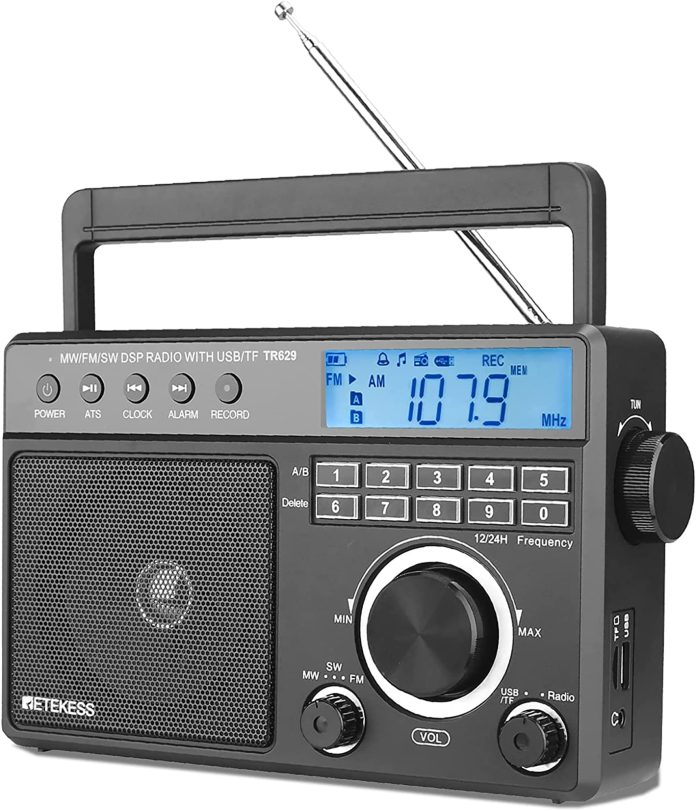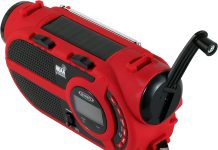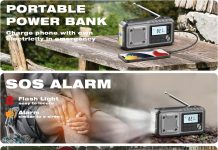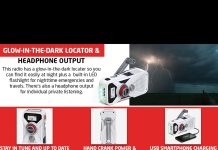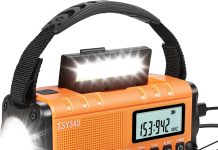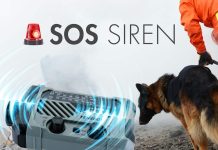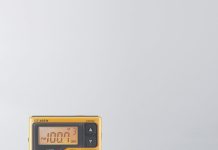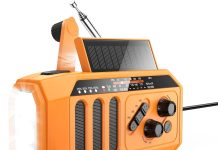We must always prioritize safety in our quest for adventure and exploration in the great outdoors. When venturing into the wilderness or engaging in outdoor activities, an emergency radio is a crucial item to have on hand.
These invaluable devices serve as our lifelines, providing essential communication and critical updates in times of need. Therefore, it is essential to understand the different types of emergency radios available and choose the one that best suits our needs.
From hand-cranked to solar-powered, each option offers unique features and advantages that can significantly enhance our outdoor escapades.
Review contents
Battery-powered Radios
Advantages
Battery-powered radios are a popular choice for outdoor use due to their convenience and ease of use. One of the most significant advantages of battery-powered radios is their portability. Since they are not reliant on any external power source, they can be easily carried around while exploring the wilderness. Whether hiking, camping, or any outdoor activity, these radios can be your trusty companions, keeping you connected to the outside world.
Another advantage of battery-powered radios is their simplicity. They are relatively straightforward to operate, making them suitable for individuals of all ages and technical abilities. With just a few buttons, you can tune in to your favorite radio station and enjoy music, news, or emergency broadcasts. Simplicity is vital in emergencies; battery-powered radios provide essential information with minimal effort.
Disadvantages
While battery-powered radios offer convenience and portability, they do have some limitations. The primary disadvantage is the need for a constant supply of batteries. Batteries can be expensive, especially if you require long-lasting ones to ensure a continuous power source. Additionally, if you do not have spare batteries, your radio may become useless once the batteries run out.
Another drawback is the environmental impact of disposable batteries. Constantly discarding used batteries can harm the environment if not correctly disposed of or recycled. Therefore, it is essential to consider the environmental consequences when using battery-powered radios in the wilderness or outdoor settings.
Hand Crank Radios
Advantages
Hand crank radios provide a unique solution for outdoor enthusiasts as they eliminate the need for batteries or external power sources. The advantage of hand crank radios is the ability to generate power by simply turning a crank. This feature makes them ideal for wilderness use, where electricity may not be readily available.
One of the significant advantages of hand crank radios is their reliability. These radios can provide extended usage periods with a few minutes of cranking. Whether in the mountains, forests, or any remote area, a hand-crank radio will ensure you never lose contact with the outside world. This reliability is crucial in emergencies when access to information can make a significant difference.
Disadvantages
Despite their reliability and autonomous power, hand crank radios have a few drawbacks that must be considered. One disadvantage is the physical effort required to generate power. Continuous cranking can be tiring, especially when you need to use the radio for an extended period. Knowing your physical capabilities and choosing a hand-crank radio that suits your endurance level is essential.
Another limitation is the size and weight of hand-crank radios. Due to the inclusion of a hand crank mechanism, these radios tend to be bulkier and heavier compared to battery-powered models. This aspect can affect their portability and convenience, especially during long hikes or backpacking trips. Therefore, it is essential to strike a balance between power generation and the overall weight of the radio.
Solar-powered Radios
Advantages
Solar-powered radios harness the sun’s power, making them a sustainable and eco-friendly choice for outdoor use. These radios have built-in solar panels that convert sunlight into energy, eliminating the need for batteries or manual cranking. This makes them an excellent choice for those prioritizing renewable energy sources while venturing into the wilderness.
One of the significant advantages of solar-powered radios is their long-term usability. As long as there is sunlight, these radios can function without interruption. Exposing the built-in solar panel to direct sunlight allows you to charge the internal battery and enjoy hours of uninterrupted radio usage. This longevity is particularly advantageous for extended outdoor trips or limited access to power outlets.
Disadvantages
While solar-powered radios offer many benefits, they have a few limitations worth considering; the primary disadvantage of solar-powered radios is their reliance on sunlight. If you find yourself in an area with minimal sunlight or cloudy weather conditions, the charging capabilities of these radios may be significantly reduced. It is crucial to assess the weather conditions and plan accordingly to ensure a consistent power supply.
Another aspect to consider is the initial investment required for solar-powered radios. Since they incorporate solar panels and more advanced technology, these radios tend to be pricier than their battery-powered or hand crank counterparts. However, viewing this as a long-term investment in sustainable energy and environmental consciousness is essential.
Two-Way Radios (Walkie Talkies)
Advantages
Two-way radios, commonly known as walkie-talkies, offer a unique communication solution for outdoor enthusiasts. These radios allow direct and instant communication between individuals or groups within a specific range without cellular networks or external power sources. This makes them an excellent choice for outdoor activities that require constant communication, such as hiking, mountaineering, or team-based expeditions.
One of the advantages of two-way radios is their versatility. They offer a reliable and secure means of communication, keeping individuals connected even in remote areas where cellular signals may be weak or nonexistent. This allows for real-time updates, coordination, and assistance when needed, ensuring the safety of everyone involved.
Disadvantages
While two-way radios offer valuable communication capabilities, they have a few limitations. The main disadvantage is their limited range. The effective range of two-way radios can vary depending on various factors such as terrain, weather conditions, and interference. It is crucial to properly assess the range of the radios you choose to ensure they meet your communication needs within your intended outdoor environment.
Another drawback is the dependency on charged batteries. Two-way radios require a constant power supply to function, and communication will be cut off if the batteries run out. It is essential to have spare batteries or a reliable charging method to avoid the radios becoming ineffective during critical moments.
Weather Radios
Advantages
Weather radios are explicitly designed to provide continuous access to weather updates and alerts, making them a crucial tool for outdoor enthusiasts. These radios receive broadcasts from the National Weather Service, informing you about changing weather conditions and potential hazards in your area.
One of the significant advantages of weather radios is their accuracy and reliability. They are designed to provide up-to-date information directly from meteorological experts, ensuring that you receive accurate forecasts and warnings. This real-time data can be invaluable when planning outdoor activities or responding to sudden weather changes.
Disadvantages
Despite their accuracy and reliability, weather radios have a few limitations that must be considered. The main disadvantage is their single-functionality. Weather radios are primarily designed to receive weather updates and alerts, and their capabilities are limited to this purpose. If you are looking for a radio that offers additional features such as entertainment or communication, you may need to consider a multi-purpose radio.
Another drawback is the dependency on a reliable signal. Weather radios need access to a solid signal to receive broadcasts effectively. In areas with weak or no reception, the functionality of these radios may be compromised. It is essential to assess the signal strength in your intended outdoor location and choose a weather radio that offers reliable reception.
Shortwave Radios
Advantages
Shortwave radios offer a unique listening experience for outdoor enthusiasts. These radios receive broadcasts from around the world, allowing you to explore international stations and immerse yourself in a wide range of content. Shortwave radios can be a source of entertainment, information, and cultural exploration while enjoying the wilderness.
One of the advantages of shortwave radios is their extensive coverage. Unlike standard FM/AM radios that are limited to local stations, shortwave radios can pick up signals from distant locations. This global reach opens up a world of possibilities, providing access to news, music, and cultural content from various countries.
Disadvantages
Despite their extensive coverage and unique content offerings, shortwave radios have a few drawbacks that must be considered. The main disadvantage is the susceptibility to interference. Various factors can affect shortwave signals, such as atmospheric conditions, solar activity, and electrical interference. These factors can result in fluctuating signal strength and occasional distortion, limiting the clarity of the broadcasts.
Another limitation is the complexity of shortwave radios. Shortwave radios can be more challenging to operate and tune than standard radios. They often require a keen understanding of frequency tuning and antenna adjustment to optimize reception. It is essential to familiarize yourself with the operation of shortwave radios before venturing into the wilderness to ensure a satisfactory listening experience.
Multi-band Radios
Advantages
Multi-band radios combine the functionality of various radio bands, offering a comprehensive listening experience for outdoor use. These radios typically include FM, AM, and shortwave bands, allowing you to enjoy a wide range of content from local, international, and emergency stations.
One of the significant advantages of multi-band radios is their versatility. They cater to different preferences and needs, providing access to local news, music, entertainment, and emergency broadcasts. Whether you want to stay informed about local events or explore international stations, a multi-band radio can be your go-to device in the wilderness.
Disadvantages
While multi-band radios offer versatility and convenience, they come with limitations. The main disadvantage is their complexity. With multiple bands and functions, these radios can be more challenging than single-band radios. It is essential to familiarize yourself with the features and controls to maximize the functionality of a multi-band radio.
Another drawback is their power consumption. Multi-band radios have higher power requirements to support the various bands and additional features. This can result in a shorter battery life compared to single-band radios. It is crucial to consider your power supply options, such as spare batteries or alternative charging methods, to ensure continued radio usage during outdoor trips.
Portable Radios with Emergency Features
Advantages
Portable radios with emergency features are designed to provide essential functions during emergencies and can be highly beneficial in wilderness or outdoor settings. These radios often include features such as built-in flashlights, SOS signals, and emergency alert systems, ensuring your safety and facilitating rescue efforts if needed.
One of the advantages of portable radios with emergency features is their all-in-one functionality. They combine the capabilities of a regular radio with emergency tools, eliminating the need to carry separate devices. Whether you require access to crucial information, need illumination at night, or want to alert others of your emergency, these radios can meet your needs.
Disadvantages
Despite their emergency functionalities, portable radios with emergency features have a few disadvantages worth considering. The main disadvantage is their reliance on batteries. These radios often require a power source to operate the radio and the emergency features. It is crucial to ensure you have spare batteries or alternative charging methods to avoid the emergency functionalities becoming inaccessible.
Another drawback is the availability of emergency alert systems. These radios rely on receiving signals from government agencies or designated broadcasters to activate emergency alerts. The effectiveness of these alerts depends on the coverage and services provided in your specific outdoor location. It is essential to research and understand the emergency alert capabilities in your intended area to assess the reliability of these systems.
Waterproof Radios
Advantages
Waterproof radios are designed to withstand exposure to water, making them an excellent choice for outdoor activities that involve water bodies, such as boating, fishing, or water sports. Waterproof radios’ advantages are their durability and resistance to water damage, ensuring reliable performance even in wet conditions.
One of the significant advantages of waterproof radios is their peace of mind. You can enjoy your outdoor water adventures without worrying about accidental water splashes or rain affecting your radio’s functionality. Whether relaxing on a boat or exploring a rainy forest, a waterproof radio can keep you entertained and connected, no matter the weather conditions.
Disadvantages
While waterproof radios offer protection against water damage, they have a few limitations that must be considered. The main disadvantage is their vulnerability to submersion depth and duration. While waterproof radios can withstand water exposure to a certain extent, they may not fully resist extended submersion or deep dives. It is crucial to assess the waterproof rating and specifications of the radio to ensure it meets your water-related needs.
Another drawback is the impact on sound quality. Waterproofing measures can affect the sound transmission and quality of the radio. While these radios are designed to provide reliable performance in wet conditions, audio clarity might be slightly compromised. Testing the sound quality of a waterproof radio before venturing into outdoor activities involving water is recommended.
Durable Radios
Advantages
Durable radios are designed to withstand rough handling, impacts, and rugged outdoor conditions. These radios can handle drops, bumps, and extreme temperatures, making them an essential choice for wilderness or outdoor use where durability is crucial.
One of the significant advantages of durable radios is their reliability. They are built to withstand various elements, such as dust, water, and extreme temperatures, ensuring continuous performance even in harsh environments. Whether climbing a mountain, exploring dense forests, or engaging in any outdoor activity involving physical challenges, a durable radio can be your trusted companion.
Disadvantages
While durable radios offer reliability and resilience, they have some limitations. The main disadvantage is their bulkier and heavier build. To provide additional protection, durable radios often incorporate reinforced casings and materials, resulting in a larger and heavier device than standard radios. When choosing a durable radio for outdoor outdoor adventures, assessing your portability requirements and physical capabilities is essential.
Another drawback is the potential impact on battery life. The additional protection measures in durable radios can sometimes affect the battery’s efficiency, resulting in shorter usage time than regular radios. It is essential to consider power supply options and plan to ensure continuous radio usage during outdoor trips.
In conclusion, selecting the right emergency radio is vital for staying connected, informed, and safe when it comes to wilderness or outdoor use. Battery-powered radios offer convenience and simplicity, while hand-crank radios provide an autonomous power source. Solar-powered radios promote sustainability, and two-way radios facilitate communication within specific ranges.
Weather radios prioritize weather updates and alerts, shortwave radios offer global broadcasts, and multi-band radios combine different functionalities. Portable radios with emergency features provide versatility, while waterproof and durable radios offer protection in challenging conditions.
By considering the advantages and disadvantages of each type of emergency radio, you can make an informed decision that suits your specific outdoor needs. Remember to prioritize functionality, reliability, and the ability to adapt to changing situations to ensure a successful and enjoyable outdoor experience.

